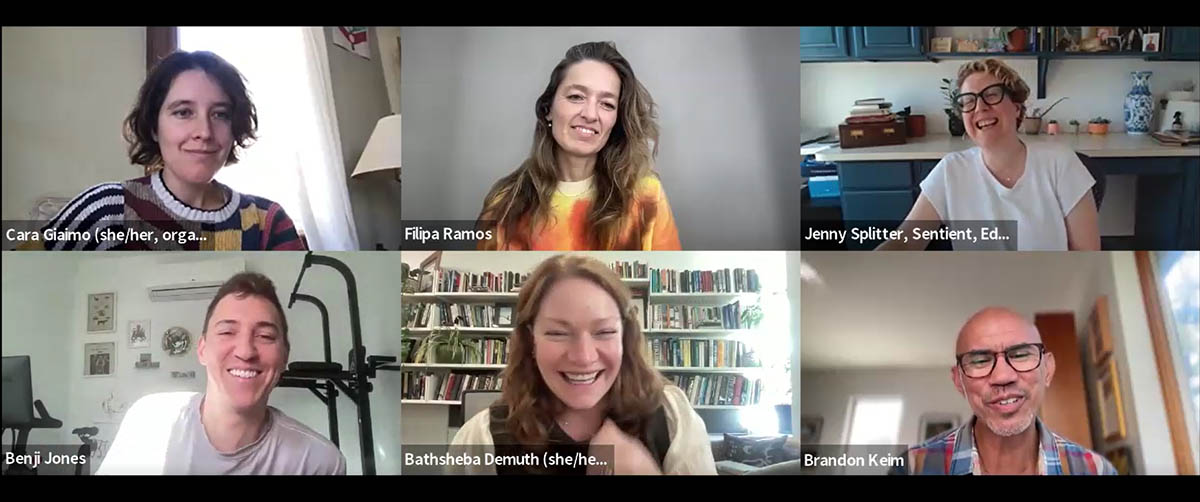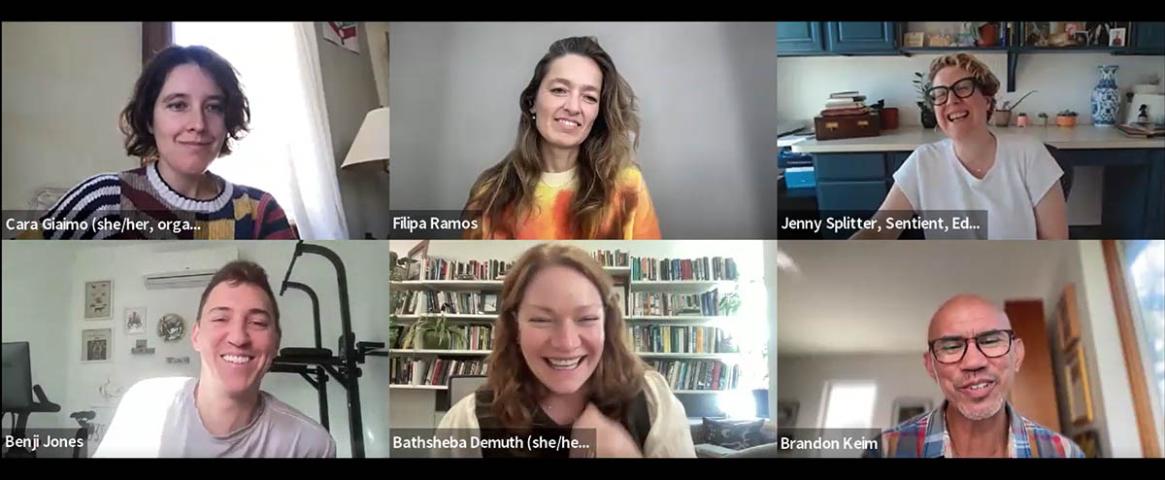Story by Brianne Linne
The "Nonhumans as Characters: What to Do When Your Subjects Can't Speak to You" NASW workshop at ScienceWriters2024, organized by Cara Giaimo, was moderated by Brandon Keim. Keim is a journalist whose science and animal-focused writing has been featured in The New York Times, The Atlantic, WIRED, and the author of the recently published book Meet the Neighbors: Animal Minds and Life in a More-Than-Human-World, about the science of animal intelligence. Keim opened the session with a reflection on a poignant moment in his own scientific reporting. He reflected on a past assignment wherein he reported on a lawsuit filed by the Nonhuman Rights Project pursuing legal personhood for chimpanzees, and then, years later, encountering a scientific article on chimpanzee locomotion.
“And I realized, wait a minute, this is Hercules and Leo,” Keim recalled, upon recognition that the subjects of the scientific article were two of the plaintiffs in the former lawsuit. He shares how he was struck by the dichotomy between how the exact same animals could be portrayed — either as defendants in a lawsuit or in a removed discussion of their locomotion mechanics.
Held virtually on Oct. 18, the session’s panel was comprised of Bathsheba Demuth, Associate Professor of History and Environment and Society at Brown University; Benji Jones, a correspondent covering biodiversity and climate change at Vox; Filipa Ramos, an art curator and writer focused on the intersection of contemporary art and ecology; and Jenny Splitter, Editor-in-Chief of Sentient Media.
Keim opened the discussion by asking the panel in what scenarios they’ve had to portray non-human characters in their writing and how they chose to do so.
Splitter’s outlet, Sentient, focuses on covering news related to factory farming, so often their stories touch on animals in a farming setting. However, in order to avoid being misrepresented as an animal rights advocacy group, Sentient writers have to be particularly careful and factual in their treatment of the animals in their work.
Some of the other panel members, such as Bathsheba Demuth, have arrived at writing about animals from very different angles. Demuth spends a significant portion of her time living in and writing about the arctic, an environment which she depicts in her book Floating Coast: An Environmental History of the Bering Strait. When she moved there originally, she first held a job training sled dogs. “So, the dependence was very literal,” she reflected, “And the idea that I somehow was the being who was in charge of decision making was a hilarious fiction.” She cited this obvious dependence on the animals around her in the arctic as a foundation for her approach to writing about animals in which she strives to convey that “we are just one of the many species that are part of creating the world we live in.”
Keim also asked the group how they contend with gaps in scientific knowledge when representing these nonhumans in their work. Mysteries abound in the realms of animal behavior, organism life stages, or other facets of these characters we seek to understand.
Benji Jones shared that he treats these gaps in scientific understanding enthusiastically. He recommended that writers be as upfront as they can be about what is known and unknown and lean into and embrace these knowledge gaps when they find them. As an example, Jones cited research on octopuses where visual evidence suggests that they may be dreaming, but scientists are still working to understand the nuances of the organism’s sleep cycle. “There is still so much that we have yet to learn, and that mystery can be a real hook... and also motivation and inspiration to learn more about the natural world.”
Ramos, on the other hand, suggested that perhaps we should allow space for the possibility that we may never close some of these gaps. “Sometimes I think that it could be less about comprehension but more about... comprehending that it’s impossible to understand,” she suggested.
The panelists also reflected on times when their work has extended to non-animal characters and strategies which they have leveraged to enliven their writing on these subjects.
Demuth shared that the book that she is currently working on is focused on a river and reported that portraying this natural geographical feature has been a challenge but often comes down to word choice. For example, “being able to think about what a river does and represent that in verbs that are not hydrological to kind of break it out of some of the scientific mold,” she said. Demuth challenges herself and the audience to think about rivers, for example, as “things that have lifespans.” She continued: “the river that I work on was formed at the end of a particular glaciation and at some point will no longer exist — so it has an arc in that sense.”
Jones echoed Demuth’s sentiment on the importance of word choice, adding that when he portrays a non-animal subject like kelp, he aims to be as descriptive as possible to try to capture the features that make it fascinating in his own eyes — “describing the movement, really trying to understand how the kelp reproduces, how it floats on the surface” and try to translate these descriptions into writing that will be impactful for the audience.

Cara Giaimo, Filipa Ramos, Jenny Splitter, Benji Jones, Bathsheba Demuth, and Brandon Keim speak during ScienceWriters2024 Early Access. (Ben Young Landis/NASW)
Brianne Linne is a freelance science writer and postdoctoral researcher at the University of Pennsylvania, where she researches human olfaction.
This ScienceWriters2024 conference coverage article was produced as part of the NASW Conference Support Grant awarded to Linne to attend the ScienceWriters2024 national conference. Find more 2024 conference coverage at www.nasw.org
A co-production of the National Association of Science Writers (NASW), the Council for the Advancement of Science Writing (CASW), and the Science Communicators of North Carolina (SCONC), the ScienceWriters2024 national conference featured an online portion Oct. 16-18, followed by an in-person portion held in Raleigh, N.C., Nov. 8-11. Follow the conversation via #SciWri24 on Bluesky and on LinkedIn.
Founded in 1934 with a mission to fight for the free flow of science news, NASW is an organization of ~2,400 professional journalists, authors, editors, producers, public information officers, students and people who write and produce material intended to inform the public about science, health, engineering, and technology. To learn more, visit www.nasw.org and follow NASW on LinkedIn and Bluesky. And join us in celebrating #NASW90th.
Credits: Reporting by Brianne Linne; edited by Ben Young Landis.




